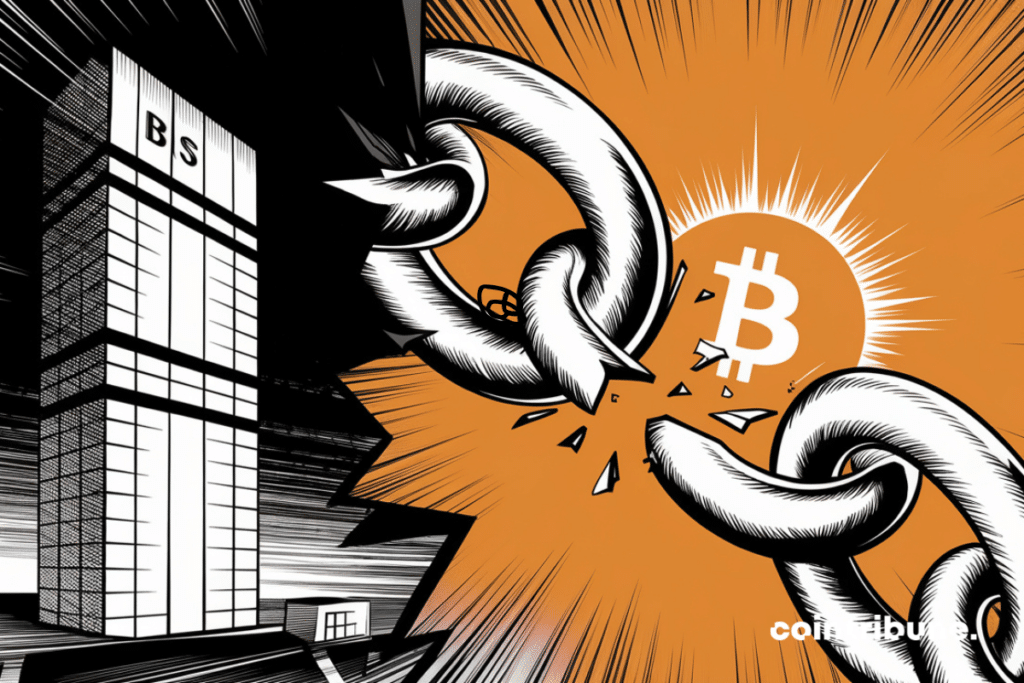Augustine Carsten, the general manager of the Bank for International Settlements in 2020.
— Senator Gerard Rennick (@SenatorRennick) August 3, 2023
“A key difference in with the CBDC is that central bank will have absolute control on the rules and regulations that will determine the use of that expression of central bank liability.… pic.twitter.com/hNGFGWOQqC
A
A
The MBridge Blockchain Falls Through
Wed 30 Oct 2024 ▪
6
min read ▪ by
Getting informed
▪
Investissement
Summarize this article with:
The mBridge blockchain, overseen by the Bank for International Settlements, seems to be struggling. Good news for Bitcoin.

Is the BIS blowing up the bridges?
While the BRICS summit was taking place in Kazan, the G7 camp was meeting in Washington for the annual assembly of the International Monetary Fund. According to Bloomberg, the famous mBridge project was the subject of negotiations during this IMF and World Bank meeting. The halting of the project is being considered.
Developed under the auspices of the BIS Innovation Hub, mBridge is being heralded as a new Forex for central bank digital currencies (CBDC). The research is being carried out by the central banks of China, Thailand, Hong Kong, and the United Arab Emirates, all members or on their way to becoming members of BRICS.
The goal is to build an alternative system to the current “Correspondent Banking System” which heavily relies on the dollar and American banks.
Correspondent banking, in French, means opening an account in a foreign bank to carry out transactions in a local currency (dollar, yen, ruble, etc.). This concretely means that if a French bank wants to keep its clients’ dollar holdings, it must open an account in an American bank.
The BRICS view mBridge as a serious avenue to restructure the international monetary system once geopolitical tensions have eased.
However, it seems that Western decision-makers have not yet resigned themselves to giving up their monopoly. The disconnection from global payment networks has become a central weapon in the Western arsenal.
mBridge, the pale copy of Bitcoin
Saudi Arabia has recently joined the mBridge project, suggesting that China – the chief architect of the project – is indeed developing an interesting solution.
This is significant given that Chinese President Xi Jinping called in November 2022 from Riyadh for Gulf countries to accept the Chinese yuan in payment for their oil.
Essentially, mBridge is a blockchain that enables instant cross-border payments as well as currency exchange operations. The specifications were to create a system resistant to censorship.
Indeed, let’s not forget that the G7 froze nearly 300 billion euros and dollars belonging to Russia. The gravity of this decision should not be underestimated. This has not gone unnoticed by China and Saudi Arabia, who fear being next on the list.
As of the latest news, mBridge operates with a consensus mechanism known as “HotStuff”. The same mechanism that was considered by Facebook (Libra) and is used by Ethereum for its staking protocol. It is essentially an alternative to Bitcoin’s Proof-of-Work mechanism.
Unfortunately, the BIS finds itself in a delicate position today, torn between its desire to promote CBDCs and complex geopolitical realities. A potential pause on the mBridge project seems all the more likely given that Donald Trump is categorically opposed to CBDCs.
“A CBDC would give the federal government absolute control over your money. It’s a dangerous threat to freedom and I will stop it from happening in America,” he stated at the beginning of the year.
And here for the Anglophones is what the head of the BIS stated in 2020 about CBDCs:
What about Bitcoin?
Donald Trump will likely bring an end to the war in Ukraine. Nevertheless, it is also probable that a trade war with tariffs will follow.
The tensions, while perhaps less severe, will therefore remain. The Republican candidate has already threatened to implement 100% tariffs against countries that refuse to hold their reserves in U.S. debt.
Put differently, if the BRICS persist in their strategy, their trade with the United States will decline. Washington will have no choice but to reduce its trade deficit to protect the value of the greenback.
This would be somewhat the end of “the end of the Bretton Woods system” which allowed the United States to print money to benefit from a chronically trade-deficit balance.
Renouncing this exorbitant privilege would represent, in a way, the resurgence of the spirit of Bretton Woods. In clear terms, trade balances would again be settled in a true store of value. However, it is hard to see how gold could make a comeback in a world where Bitcoin is king.
Donald Trump seems to understand that Bitcoin is the best store of value in the world. His promise to create a strategic reserve of Bitcoins could be a winning gamble.
Bitcoin currently accounts for less than 10% of gold’s market capitalization. Accumulating one million BTC before the rest of the world will help soften the blow of the relentless decline of America’s outrageous monetary hegemony.
The transformation of the dollar into a political weapon has dug its grave. The world will sooner or later obtain its absolute and stateless store of value. Bitcoin appears more than ever as a more realistic solution than the CBDCs.
Maximize your Cointribune experience with our "Read to Earn" program! For every article you read, earn points and access exclusive rewards. Sign up now and start earning benefits.
A
A
Bitcoin, geopolitical, economic and energy journalist.
DISCLAIMER
The views, thoughts, and opinions expressed in this article belong solely to the author, and should not be taken as investment advice. Do your own research before taking any investment decisions.